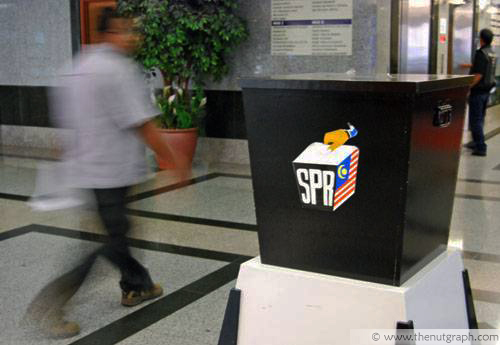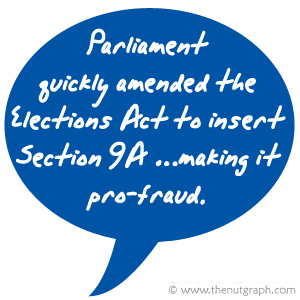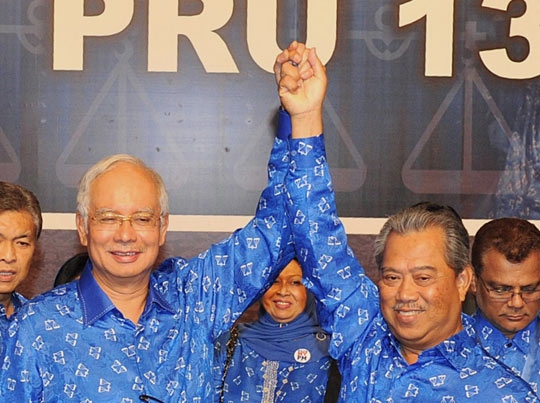
IT would seem there is still dust in the air even though it’s been nearly four months since the 5 May 2013 general election known as GE13. Post-elections, Barisan Nasional (BN) filed 21 election petitions while Pakatan Rakyat (PR) lodged 35 of its own in both parliamentary and state seats. Additionally, there has been talk of a unity government even though this has been denied by Prime Minister Datuk Seri Najib Razak.
Why bother with election petitions? And what’s beyond these election petitions and all that talk of a unity government? What else do citizens need to be aware of and be vigilant about if Malaysians are to get a cleaner and fairer electoral system come GE14? The Nut Graph asks political scientist Dr Wong Chin Huat.
Was there any difference in the motivation behind BN’s and behind PR’s election petitions? What’s the purpose of petitioning? Why not just accept the results of GE13?
Candidates file election petitions for two reasons. It’s either to have the election outcome overturned so that they can be declared the rightful winners without fresh elections, or nullified so that they can have a second chance in a new election which should be run fairly.
Election petitions are stories where there are villains. These villains are at best, incompetent people who make stupid but innocent mistakes and at worst, evil people who violate democracy through deliberate fraud and manipulation.
For the PR, the story is straightforward. The villains are the BN and the Election Commission (EC) it controls which denied PR their victory. I doubt that PR was hoping to overturn the results in any of the constituencies they filed petitions for. Rather, their aim was to force re-elections.
Had they secured re-elections in all the 25 parliamentary seats they petitioned for, it would have been a mega season of by-elections. With the remaining 108 seats in BN’s hands and 89 seats in PR’s hands, it would have been a national referendum for the electorate in those 25 constituencies to decide whether PR should be made the new government. Of course, PR would have known there was a fat chance of that happening.

For the BN, the story is more complicated. It is perfectly fine for a few candidates to feel wronged by the system. But what message is BN sending by appealing the outcome in 21 out of 727 (nearly 3%) of the parliamentary and state seats it contested? That the PR is so powerful that they can play dirty in so many places? Or that the Bersih 2.0 coalition was right about the EC’s incompetence in conducting elections?
I suspect the real reason for the BN’s many election petitions was insurance. In the event some judges boldly rule in the opposition’s favour, the BN can then count on some court wins to negate those PR victories.
This method of challenging what is perceived to be a flawed electoral system doesn’t seem to have worked at all, especially for PR. As of early August, four BN petitions will go to full trial while 20 PR petitions have been struck out based on preliminary objections and filing errors. Additionally, the courts have imposed a high cost against petitioners. When have petitions actually worked to resolve discrepancies in an election?

It’s legitimate to ask if election petitions really provide a remedy. Historically, election petitions have rarely seen the election outcome overturned or nullified. One rare exception was the case for the Pasir Putih parliamentary election in 2004. Citing a “genuine mistake” by the EC’s returning officer, the election court declared the Umno candidate the rightful winner three months after the elections, overturning a 3,810-vote majority. Then Parliamentary Opposition Leader Lim Kit Siang described the case as horse-trading that “stinks to high heaven”.
Election petitions seldom succeed because of Section 32 of the Election Offences Act 1954. The section stipulates that for an election to be declared void, corrupt practices or non-compliance with the laws must appear to “have affected the result of the election”. This is akin to arguing that an athlete should not be deprived of her medal unless one can prove that the prohibited drugs she took affected the result of the race.
 In fact, the law seems to be worded not to stop crime but to protect criminals. In 2001, High Court judge Datuk Muhammad Kamil Awang ruled that the 1999 Likas state election was null and void on the grounds that the electoral roll had been tampered with and contained illegal voters. Muhammad Kamil said the “instances of non-citizens and phantom voters in the electoral roll as disclosed in the trial may be the tip of the iceberg”. It was after this case that Parliament quickly amended the Elections Act to insert Section 9A which prohibits electoral rolls from being challenged in court, hence making it pro-fraud.
In fact, the law seems to be worded not to stop crime but to protect criminals. In 2001, High Court judge Datuk Muhammad Kamil Awang ruled that the 1999 Likas state election was null and void on the grounds that the electoral roll had been tampered with and contained illegal voters. Muhammad Kamil said the “instances of non-citizens and phantom voters in the electoral roll as disclosed in the trial may be the tip of the iceberg”. It was after this case that Parliament quickly amended the Elections Act to insert Section 9A which prohibits electoral rolls from being challenged in court, hence making it pro-fraud.
Opposition Leader Datuk Seri Anwar Ibrahim has said PR has not exhausted all legal avenues yet. It still has applications regarding the use of indelible ink which are pending. If even these fail, what do you predict the opposition will do?
I don’t think the indelible ink suit will be successful. And unfortunately, I think Anwar and the opposition in general have lost the plot. We have not seen any signs that they know what their next steps will be. They seem to be just waiting for the Umno elections and hoping for the party’s implosion.
PKR has been playing up Najib’s offer of a “unity government” which may indeed be true even if officially denied by the prime minister. These reports do not give the public much confidence of any “new politics”. Rather it’s the same old horse trading behind smoke screens.

Some people may want to just move on from GE13, and may want our politicians to start leading the country instead of harping on the problems of GE13. If politicians were to move on, what areas can they focus on that would ensure freer and fairer elections at GE14?
Frankly, I think people who say “let’s just move on” are dreamers. Either that or they are high on the drug Pragmatism. The problems we face today — from the post-election protests to the post-election witch-hunt — are because we are in the midst of a transition from an electoral one-party state to a multiparty democracy.
How can we “move on” if GE14 may still deliver a government with a minority of popular votes and the opposition still loses in seats despite winning, say, 60% of votes? How to “move on” when Umno and Malay ultra-nationalists refuse to respect that 53% of voters voted against the BN and whip up anti-minority sentiments in every instance possible?
To pretend that the problems will disappear just because we turn our heads away is wishful thinking, to say the least. And lest we forget, the path to hell is often paved with good intentions.
A re-delineation exercise is expected to occur at the end of this year. What do citizens need to be aware of about this exercise? And what can they do about it?

Constituency re-delineation in Malaysia could have crucial implications. If malapportionment and gerrymandering go unchecked, GE14 may indeed install another government with minority votes, with possibly even lower support, say only 45% or 40% of the popular vote. In such a situation, Umno hardliners may be more desperate to play up communal sentiments for their survival. In that situation, will anyone still expect political stability and politics as usual?
Citizens can intervene in the re-delineation process. Besides state and local governments, any group of 100 or more citizens affected by new constituency boundaries can present their objection within 30 days after the proposed boundaries are unveiled. They can stop rampant and outrageous malapportionment and gerrymandering, which got through easily in the past because not enough people cared.
Citizens can also participate in, follow and disseminate the revelations from the People’s Tribunal organised by Bersih 2.0. We can also support the campaign to abolish Section 9A of the Elections Act. ![]()
Wong Chin Huat is a political scientist by training and was a journalism lecturer prior to joining the Penang Institute, a Penang government think tank. He is also a steering committee member of Bersih 2.0. If readers have questions and issues they would like Wong to respond to, they are welcome to e-mail editor@thenutgraph.com for our consideration.
Read previous Uncommon Sense columns

